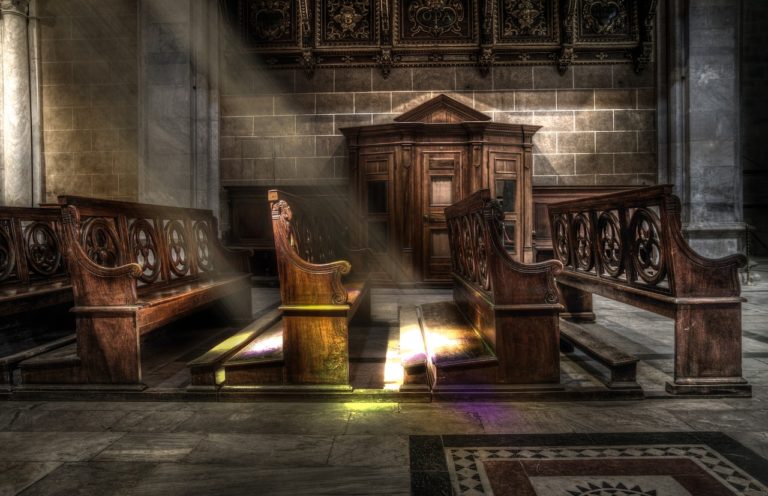When the Role of Women in Church Becomes a Potential Deal-Breaker
You may remember me writing about how we’ve been church-homeless for going on four years, and how difficult it can be to find a church that feels like the right fit. Sometimes, God makes it really clear that you’re supposed to be part of a certain church during a certain season. Other times, he can be silent, seeming to leave it up to you. This season of church seeking for us has felt like the latter.
Add to the general difficulties the fact that it’s really hard to visit churches with a toddler in tow. You have to choose between entertaining them during the service (and therefore missing the point of visiting in the first place, because you can’t do this and pay close attention to what’s going on up front) or trying to leave them in an unfamiliar nursery setting. We tried both a number of times, but found it wasn’t worth it.
We went into the new year with a new plan: as the extrovert in our marriage, the one who finds it easy to walk into a strange new place and make myself at home, I’d do the hunting, visiting area churches alone. When I found one that seemed like a real possibility, E and L would join me. It was a good plan, one that worked for our family dynamic. Unexpectedly, the very first church I visited seemed like a great fit for us. The church’s belief statement and mission lined up with what we believe. The people were friendly and welcoming. The teaching was relevant and engaging. There were abundant opportunities to get involved and to serve both within the local community and worldwide. There was a clear heart for missions and caring for the poor.
I went alone for a few weeks, then started taking L along, as thesis work was in high gear for E at that point. I gradually got L accustomed to the nursery. I inquired about the small group ministry, and started visiting a family group with L (since it meets on the night E has his internship, he wasn’t able to join us). The families in the group were warm and welcoming. E came to a Sunday service and pronounced it good.
I was loving it.
Maybe finding the right church isn’t going to be so hard after all, I thought.
And then it happened. My bubble burst.
Tuesday night, as we were about to wrap up our study time, the group coordinator announced that his family was going to take a much-needed break from small group ministry, that the rest of us would need to figure out what direction the group should go in. The coordinator looked around at the other husbands in the group, and suggested that one of them might feel led to step up and take over his duties.
Then, he looked at me and said, “Or maybe your husband might want to?”
Aha.
Right then and there, in my head, the walls of my new church home came silently crashing down.
No one in the small group has met E. But me, I’ve been an active participant, willing to jump right in to the weekly discussions and express my thoughts about Scripture. I’ve offered to serve in any way I can. No surprise there, right? So why would it be suggested that my as-yet-unseen husband might be the best choice to manage a group he’s never attended? Why not me? Why not one of the other women?
I took a deep breath, and asked for clarification. I suspected what the explanation would be, but I needed to ask for it anyway, to be fair as well as to confirm my fears.
He gently explained that the church doesn’t allow women to lead or teach co-ed groups.
Even though I’d expected it, hearing those words actually spoken out loud was a blow. I looked around the room at all of these kind, caring people who love each other and their kids and their church so visibly, and I just thought about how much I didn’t want to say anything hurtful or offensive. It was one of those moments when you’re completely still and calm and quiet on the outside while really, everything is exploding on the inside. I felt like I couldn’t breathe. I think I just quietly said this was going to be an issue for me, and I talked briefly about the book I’ve been reading. I’m not sure I was very articulate or got any kind of point across. I was more just treading water, trying to offer some kind of explanation for the emotions they couldn’t even see were there.
On the way home, I let it all rise up: shock, anger, disappointment.
I was shocked because nothing I’d read in the church’s doctrinal statement gave me the slightest inkling that women in leadership might be an issue. If asked, I would have said that this is a modern evangelical church seeking to be Gospel-centered and culturally relevant.
I was angry because I don’t believe restricting women from leadership is either Gospel-centered or culturally relevant.
I was disappointed because I expect more from the modern non-denominational church.
It’s odd timing, this situation, because over the past couple of weeks, all my underlying questions, uncertainties, and fears about the appropriate role of women in the church have been calmed, quieted, and answered by one remarkable book: Jesus Feminist by Sarah Bessey.
I didn’t know how hungry I was for the truths in Jesus Feminist until I began to read it. All the pain and confusion of years of church sermons and Christian writings assuming that the well-known passages about what Sarah Bessey calls “the silent women of Paul” exclusively define the role of women in the church (see 1 Corinthians 14:34-35 and 1 Timothy 2: 11-12) – well, all of that pain and confusion just rose up out of the deepest parts of me and lifted off.
I felt lighter. I felt freed.
Sarah Bessey points out that while some churches and theologians focus on the aforementioned verses that call women to submission and silence as the universal standard for the behavior of women, those verses are part of one group of writings within the Bible – the letters of Paul to the various first-century churches – and that we have to look at those verses in context. And context debunks the idea that those verses should be the universal standard for women in all churches throughout time.
She also points out that there are other verses – far more, in fact – that exalt the role of women. That talk about women leading with authority over men as well as other women. About women teaching and encouraging alongside men. About women prophesying. Acts 2:18 and 1 Corinthians 14:39 are two of these.
I can’t possibly go much deeper into everything Sarah Bessey lays out in one blog post, nor do I want to. I’m not out to re-do the amazing job she’s already done. I do, however, want to point you to Jesus Feminist if you want to go deeper into this topic.
I also want to confess that I am wrestling over this situation I’m in. Hard.
I’ve been blessed that the churches of my 20s and 30s viewed women and men as equals. The church of my adolescent years was a bit different. Women in that church could only lead and teach other women. They could not speak from the pulpit or collect the offering or lead worship. They could not baptize.
My years in that church did a lot more damage than I realized. They left behind a deep-rooted uncertainty about the way I was made. About who God created me to be. About what my role in ministry really ought to look like. And for years, I stuffed that uncertainty way, way down inside. I silenced it. I ignored it. As I read through Jesus Feminist, it rose screaming to the surface and rushed away from me like an exorcised demon.
And then, on Tuesday night, it came back and stared me in the face.
I love to lead. I love to teach. I love to dialogue about tough Scriptural questions and challenge other believers. I love to intercede for others. And I can comfortably do all of these things for and with men as well as women. I’m an extrovert, a talker, someone who meets new people easily and loves to make them feel welcome, whether male or female. My spiritual gifts, according to a dozen different inventories I’ve taken over the years, are an eclectic mix of leadership, exhortation, teaching, hospitality, and prophecy.
The church home of my mid-20s cultivated my gifts. I found that my outgoing personality and my easy ability to take charge weren’t liabilities – they were desirable qualities, and my church leadership was happy for me to serve in accordance with who I am rather than by suppressing my inclinations and forcing myself into some culturally outdated standard for women. The church home of my 30s was a pioneer among churches where women in leadership are concerned.
But even the redemptive church experiences of my 20s and 30s didn’t quite wipe out the doubt that had already formed. Such things, when they happen during our formative years, they can root themselves deep within us and remain, even when we tell ourselves they’re in the past.
So now, I’m asking myself, can I be part of a church that says I am not allowed to lead or teach men simply because I’m a woman?
I don’t think I can. And I don’t think God is calling me to spend my life in a church where I am viewed as a second class citizen. Not in this country, in this culture, in this time. In the mission field, maybe, if taking a back seat meant the difference between the success or failure of the church’s ability to spread the Gospel in a certain culture. But here, in the U.S., in 2014? Our cultural context doesn’t call for such a gender structure.
Maybe I’m called to make an impact on this church somehow. Maybe it’s about speaking the truth in love. Maybe that’s why I landed there, even if it’s only to get one other person thinking about this issue with a more open mind. I will humbly ask God what he really wants us to do before we just walk out the door. It’s the right thing to do.
Jen Hatmaker says this about God’s heart and kingdom:
This is absolutely the kingdom I understand. This one. The one where Jesus tells stories that subvert power and lend honor to outcasts (Jesus! Best.). The one where He came for the sick and the lost. The kingdom that led with mercy and made religious people uncomfortable and everything was upside down. Where power is lame and humility is celebrated. The one where God sanctifies us inch by inch into the likeness of His Son, because who else would we want to emulate? This is the lens in which I understand God and it’s as biblically faithful as I know how to be.
And while I feel anger and pain on behalf of all the women in this church who have been told they’re not fit to lead or teach men, I also feel hope and a great love for those women. Because I know and understand that Jesus doesn’t see his daughters as second class citizens. I know he has called us to great things. And I know that in Heaven, we will take our seats beside the men, not behind them.






Thanks for writing about your experience. I think you echo a great many women. I plan to buy and read this book myself.
Glad this hit a chord for you, Jen. It’s really been quite a ride these past few days. Definitely read JF – it’s so affirming.
Amen! The Blue Parakeet is another great reference on this subject. It was an eye opener for me. I will be checking out Jesus Feminist. Thanks for posting!
Sarah Bessey actually refers to The Blue Parakeet in Jesus Feminist – I haven’t read that one. Have you also read Half the Church by Carolyn Custis James? That’s another she recommends, which is also one we published, and it’s next on my list.